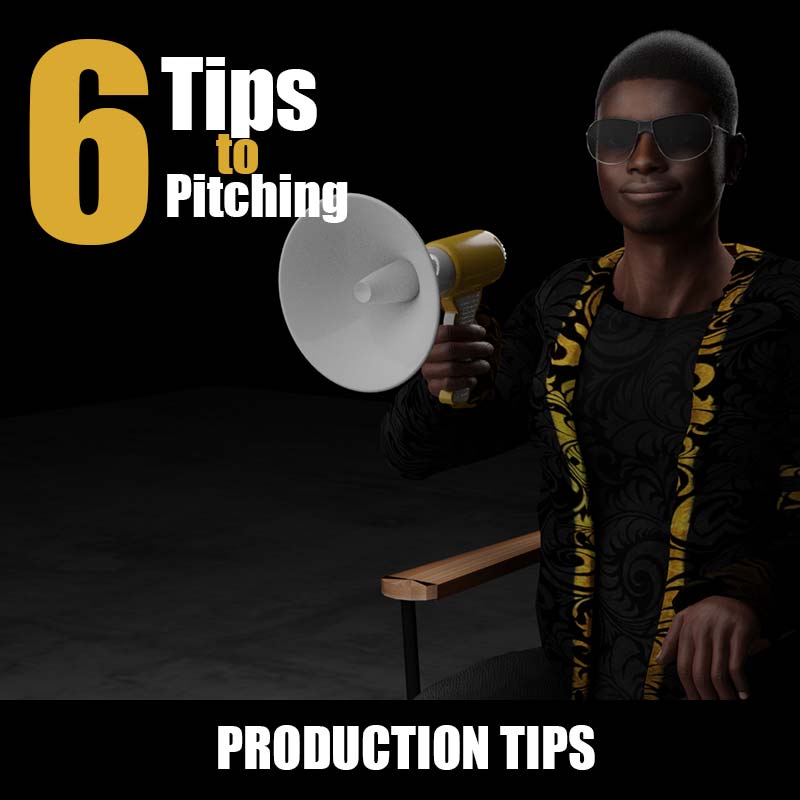Production Tips
6 Tips to pitching to a production studio | Production Tips
Ideas are the cornerstone of all our dreams, we all get that moment of brilliance. Here are 6 Helpful tips to help you pitch your idea!
Published
4 years agoon


Kudakwashe Mtuwa
6 Tips to help you pitch your idea to a production studio
6 Tips to pitching
Ideas are the cornerstone of all our dreams, we all get that moment of brilliance. You find yourself receiving that epiphany and all of a sudden you see it, all your dreams laid bare, your wonderful future full of your perception of success, whether it be the money or simply the idea of your art receiving recognition.
A lot of us dream about a world where our art is appreciated especially the script writers and artists whose success and fame rests in the hands of those willing to put faith their work and ideas. After all that’s all we need isn’t it, for someone, anyone to have faith in our vision.
Being a Production Studio ourselves we constantly receive a lot of pitches from aspiring writers, but when we then ask for further details or information, they suddenly freeze up and are found lacking. In most cases, people have a brilliant idea and don’t know where to go next.
There are so many good ideas that never see the light of day because of the way they are pitched. You`ll find no matter how good an idea is, if you don’t share it the right way, you might sound too monotonous, rude or generally lacking in inspiration. The person on the receiving end will fail to relate and appreciate your art.
A simple way to look at it is like this, you have the idea and direction of the story, but the producers have the resources needed to bring the idea to life. So when you pitch, you are trying to share that idea and impress them so they can consider making it.
A lot of people are always pitching, but only a few ideas get selected, so here are some tips to help you sell your idea. In this article we will look at the following:
1. How To Protect Your Idea
2. What information you should figure out before you start pitching
3. What exactly and how much you should share
4. Helpful Advice
5. What happens when your pitch fails
6. What happens when your pitch succeeds.
1. Protect your Idea
1. Protect your Idea

First things first, PROTECT YOUR IDEA! Nothing is heartbreaking as pitching your idea, getting turned down then after a while seeing your idea on TV with maybe a few minor adjustments or exactly as it is. This is unfortunately the story of many writers. So we consulted our lawyer, Advocate Jonasi, so we could get authentic reliable info, and this is what we got from him:
- Draft a Non-Disclosure Agreement (NDA). This is a legal document where the participants involved agree to not disclose or share any information shared within the meeting with anyone who was not part of the original meeting. That means directors and producers can’t go to their production teams without you and ask them to work on your script as that will be sharing the information shared in your meeting. It would be best to meet up in person and have them sign the document but what do you do when a physical meeting is not possible? Try to send the NDA via Email and have them sign it and send it back. However sometimes studios and directors may be reluctant to hear your idea and then asking them to sign your NDA might be pushing it and some may not even give you the time of day to even hear your idea. In such a case, communicate via Email, or Text Message. If you are to call make sure you record the call. Those methods can be used as evidence in the court of law as records can be retrieved from service providers.
Communicating via WhatsApp is not encouraged as authenticity is difficult to prove. So just get it right from the start!
This way, if your idea is stolen, you have a basis to sue them from.
Now that your idea is protected let’s go on to the actual pitching!
2. What information should you have before you start pitching?
2. What should you know?
A lot of people make the mistake of coming up with an idea and before they even develop it themselves, they go around trying to pitch an idea that’s under developed. When you get an idea, don’t just rush to pitch it. Write it down, explore it, develop it, before are things you should look at before you go around pitching:
- Originality – is it the first of its kind, what makes it unique and what does it offer that people need to see without knowing they need it, does it stand on its own? Production Studios are not just going to take an idea and make it because they like you, your idea needs to bring the studio some sort of value. Be it monetary, views or exposure. Usually new and fresh ideas stand a better chance, for example, look at popular Sitcom, HOW I MET YOUR MOTHER, which was created by Craig Thomas and Carter Bays for CBS. At the time, that type of sitcom and storytelling had never been done on TV, it was a unique idea, which CBS decided to give a shot and it paid off!

Other than Academy awards and other accolades, producing content is an unofficial competition. Production studios are competing with others to deliver content, so they need those unique and fresh ideas to capture the audience’s attention and come out on top.
There are a lot of unexplored avenues in storytelling, if you can harness that unexplored area, then you have a better chance of success. This doesn’t necessarily mean come up with an idea that’s completely out of this world. Sometimes adding a small twist or change to regular ideas works as well.
2.The Title – don’t underestimate the importance of an attractive title, especially in relation to the genre of the show. Certain titles work well for action shows, certain titles work well for romantic flicks and so on.
3. Target Audience– Who do you want to watch your show? Is it for toddlers? Teenagers? Young adults? Is it family friendly and anyone can watch it? Are you targeting specific demographics, locations?
4. Length/Duration- How long will it be? Are you aiming to write episodes that last 22 minutes? Is it a feature film, a short story? Will you be able to write something that long? How many episodes can you produce, how many seasons? Writers make the mistake of writing a lot of pages and assuming they have enough, but when their material is adapted it translates to not more than 5 minutes and they go, “AH BUT THOSE ARE A LOT OF PAGES!’’. You need to write what is called a “screenplay”. A screenplay expresses the movement, actions and dialogue of characters in a specific format. See the short description below:
‘’ Screenplays are written in 12-point Courier, or a slight variation (Courier Prime, Courier New, Courier Final Draft, etc).
Courier is a fixed-pitch font, meaning each character and space is exactly the same width. Since standard screenplay format is designed so one page equals approximately one minute of screen time, consistent spacing is important. Most scriptwriting software will default to Courier 12.
So learn how to write screenplays with the proper formatting, that way the guide above applies where writing in COURIER with font size 12 and the spacing and alignment translates one page to one minute. That way you can measure how much material you have.
5. Characters- How many characters are in your story, what are their roles, what are their relations to each other, what are their personalities? Create what is called a CHARACTER BIBLE, which will be an outline of everything that is needed to know about their character, history, personality, motivations, goals and desires.
6. Research- do your research, for example if you want to make a show of how drugs affect the youth, then go do actual research to see how drugs actually affect the youth. Most people make the mistake of using things that they have seen on tv from other shows as basis to create their content. This leads to misrepresentation of information and could embarrass you if you end up pitching to someone who is well versed in that area you are touching on. Also getting actual information on topics gives you more material to work with rather than recycling what’s been made before.
Medium/Media- Is it animated, if it is 2d animation or 3d? Is it live action? Stop motion? You need to at least know what you want it look like.
3. What exactly and how much should you share?
3. How much to share?
- Synopsis – Start with a summary. Your summary needs to contain key plotlines it needs to bring out the originality of the idea, the hook that strings them along, think of it like fishing in order to catch a fish you need the bait and you need a sharp hook to catch the fish and this summary needs to be exactly that. Quirks that make the characters interesting, the environment, the scenery. If the synopsis is turned down, at least you would have not divulged too much information.
- Pilot Episode – when your idea is still in its early stages you need to be able to show direction meaning even if u haven’t finished it, when you pitch it, it’s imperative to show from the very beginning that you don’t have an unfinished product, show that you have it all laid out and ready. Before finishing it you need the pilot to be ready because it’s the pilot that gets you the nod. To increase your chances, consider creating a pilot episode yourself, if you can afford it or know someone who can help, you can even make a low quality version of the show to show how it may look like. You can record footage with your mobile phone and act with friends. You can even record just the dialogue with your friends and include it as part of the pilot.
- Alternative endings – flexibility is key you need to be able to show different sides to your idea, meaning when your idea seems like somewhere along the lines its lost their interest you need to be able to tell them that’s one direction you saw for it however there are a number of different alternatives that can work. This increases your chances of success, if your original ending was not appealing to the directors.
4. Tough but helpful advice
4. Helpful Advice
Be humble, swallow your pride and try your best to distance yourself from your emotional attachment to your idea and try to accept modifications and changes to your idea. You need to understand this:
‘’No creative project ever turns out how you expect at the start, because creativity is exciting, vulnerable, challenging and every other emotion under the sun.”
Let’s explore this. When you have your idea, you’ll be excited and can’t wait to have it produced, but maybe the directors don’t like the way your main character sounds or the area where you want them to live or any other detail and they suggest a change. Really take time to consider it, some of those suggestions may actually be better than your original idea. Don’t get us wrong, we are not saying let them do what they want and reconstruct your idea entirely until there’s no trace of your creative input left. No, rather, as a creative, you should never let your emotional attachment blind you from getting constructive criticism that will improve your idea. Some ideas may sound amazing in our heads but when we bring them to life they may not do so well. That’s also one of the reasons why productions have “deleted scenes,”. Sometimes we animate/shoot footage and the idea sounds fun and was fun to make, but when you are now editing and compiling the whole thing, you find that that scene may not have been as amazing as you thought it would be and may not work well with the rest of the footage, so always leave room for change!
Leave room for changes, unless the changes will completely change your idea and vision, otherwise it might really make your idea really work.
5. What Happens if you don’t pull it off?
5. What to do when it doesn’t work out?
It happens, rejection is part of life. Be respectful and thank them for their time, that will allow you to come back in future with another idea or pitch and who knows your next idea might be a hit!
The following point is very important and one aspiring writers and creatives should understand;
Studios, companies, cooperates all have a vision and direction of their own. They put special attention in building their brands and the way it is portrayed. So sometimes your idea might be rejected because it doesn’t fit in with the vision of the company and not because it’s a bad idea. For example, Marvel, is known for making shows based on their comic book superheroes. That’s their primary field. If you had an idea for a romantic sitcom with multiple love triangles that focuses on the complexity of relationships in the modern day, pitching such a show to Marvel would not be best! You don’t have superheroes, and their primary audience wants to watch superheroes, so in their best interest, they will not take your show. That however does not mean your idea is bad, you might just be pitching to the wrong people. Another example, Pixar, is an animation company that makes family friendly productions, going to Pixar to pitch a live action horror flick with gore, sex and nudity would not be the best, because that does not fall in their vision and it’s not their vibe. So if your idea is turned down, move on to the next studio, they might like it. However, if you’ve been around a lot of studios and the idea is not selling consider tweaking some things and making a few changes.
6. What Happens after you pull it off?
6. What to do after you pull it off?
SIGN A CONTRACT! Agree on terms, agree on payment, agree on rights. Stuff such as; can you use the project in other areas or the studio owns it completely, will you get paid once off or you get some sort of income every single time the project is aired or sold, discuss all of that. It would be great to do your research on how it’s done in the industry and then get legal help on drafting the contract. Sometimes we have to compromise, they may not agree 100% to your terms but sometimes that’s not a bad thing. Emotional Intelligence is crucial in these situations. Discuss over how much input you will have after your idea is taken, how much can the studio change and all that. Don’t leave anything to chance, have it all written down!
Remember studios know what it takes in terms of actual resources to produce the show or your idea thus your idea has to be good enough to show them that it will be worth their investment and time.
All the best with your pitch!
Proverbialginger
July 16, 2020 at 3:23 pm
This is mind opening and beneficial, looking forward to more of your insightful information. Thank you.